Report on Transformational and Transactional Leadership Styles
VerifiedAdded on 2023/01/07
|8
|1325
|93
Report
AI Summary
This report provides a comprehensive overview of transformational and transactional leadership styles, contrasting their approaches and impacts on organizational behavior. It further explores the distinctions between operations management and operations strategy, clarifying their roles in business decision-making and long-term planning. The report also delves into how product manufacturing businesses utilize Total Quality Management (TQM) to ensure the quality of their production processes, highlighting key elements such as customer satisfaction, continuous improvement, and the benefits of TQM in achieving competitive advantages. The report references scholarly articles to support its analysis, providing a well-rounded understanding of the discussed concepts.
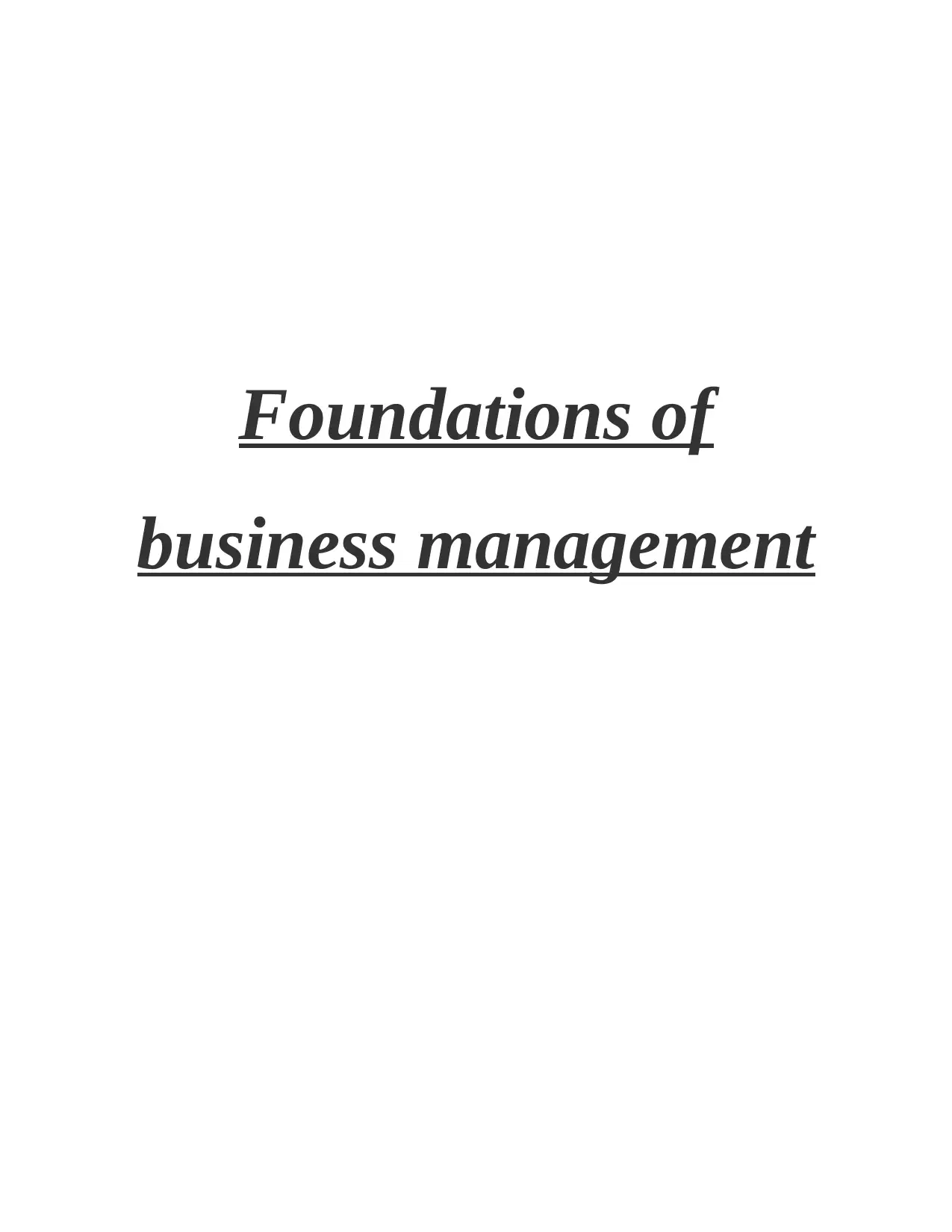
Foundations of
business management
business management
Paraphrase This Document
Need a fresh take? Get an instant paraphrase of this document with our AI Paraphraser
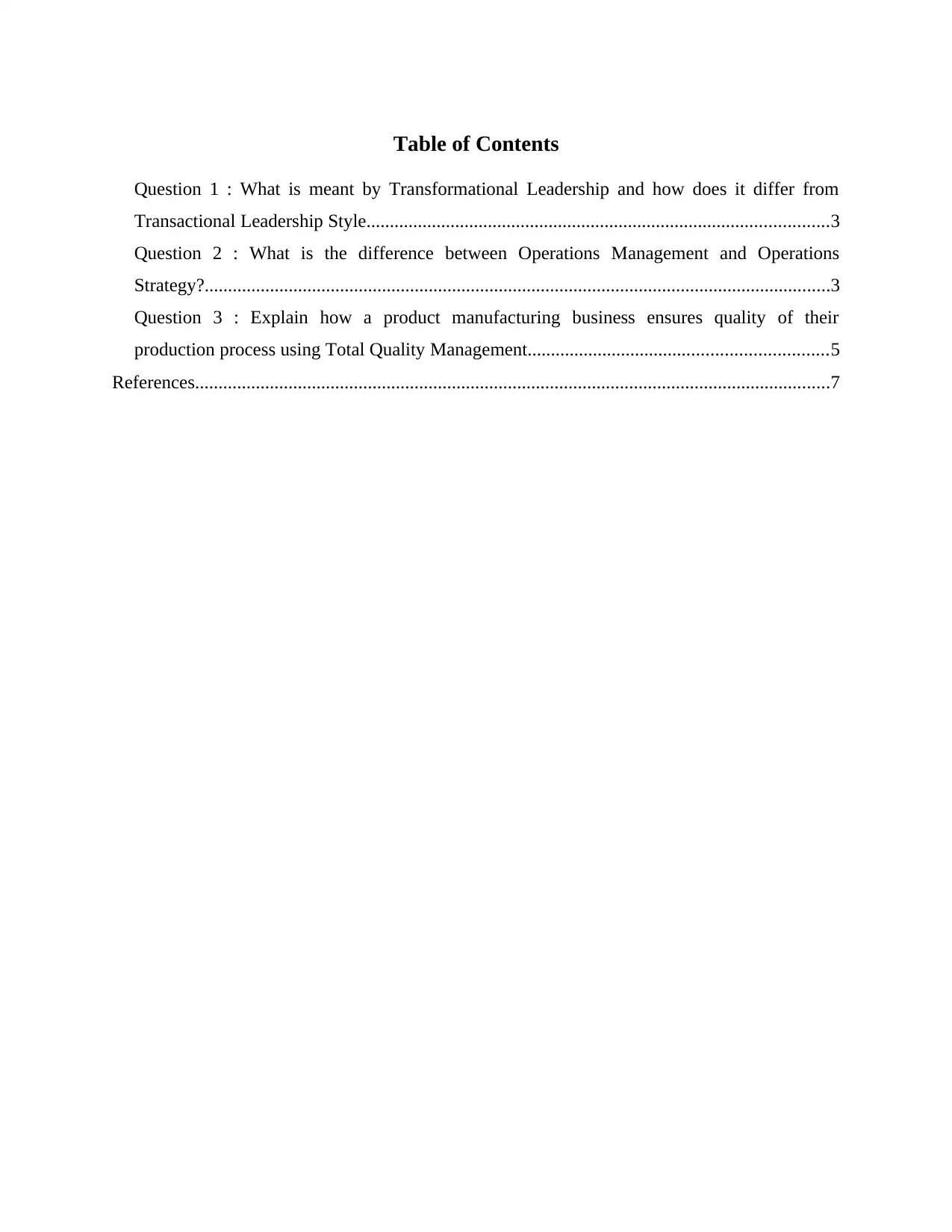
Table of Contents
Question 1 : What is meant by Transformational Leadership and how does it differ from
Transactional Leadership Style...................................................................................................3
Question 2 : What is the difference between Operations Management and Operations
Strategy?......................................................................................................................................3
Question 3 : Explain how a product manufacturing business ensures quality of their
production process using Total Quality Management................................................................5
References........................................................................................................................................7
Question 1 : What is meant by Transformational Leadership and how does it differ from
Transactional Leadership Style...................................................................................................3
Question 2 : What is the difference between Operations Management and Operations
Strategy?......................................................................................................................................3
Question 3 : Explain how a product manufacturing business ensures quality of their
production process using Total Quality Management................................................................5
References........................................................................................................................................7
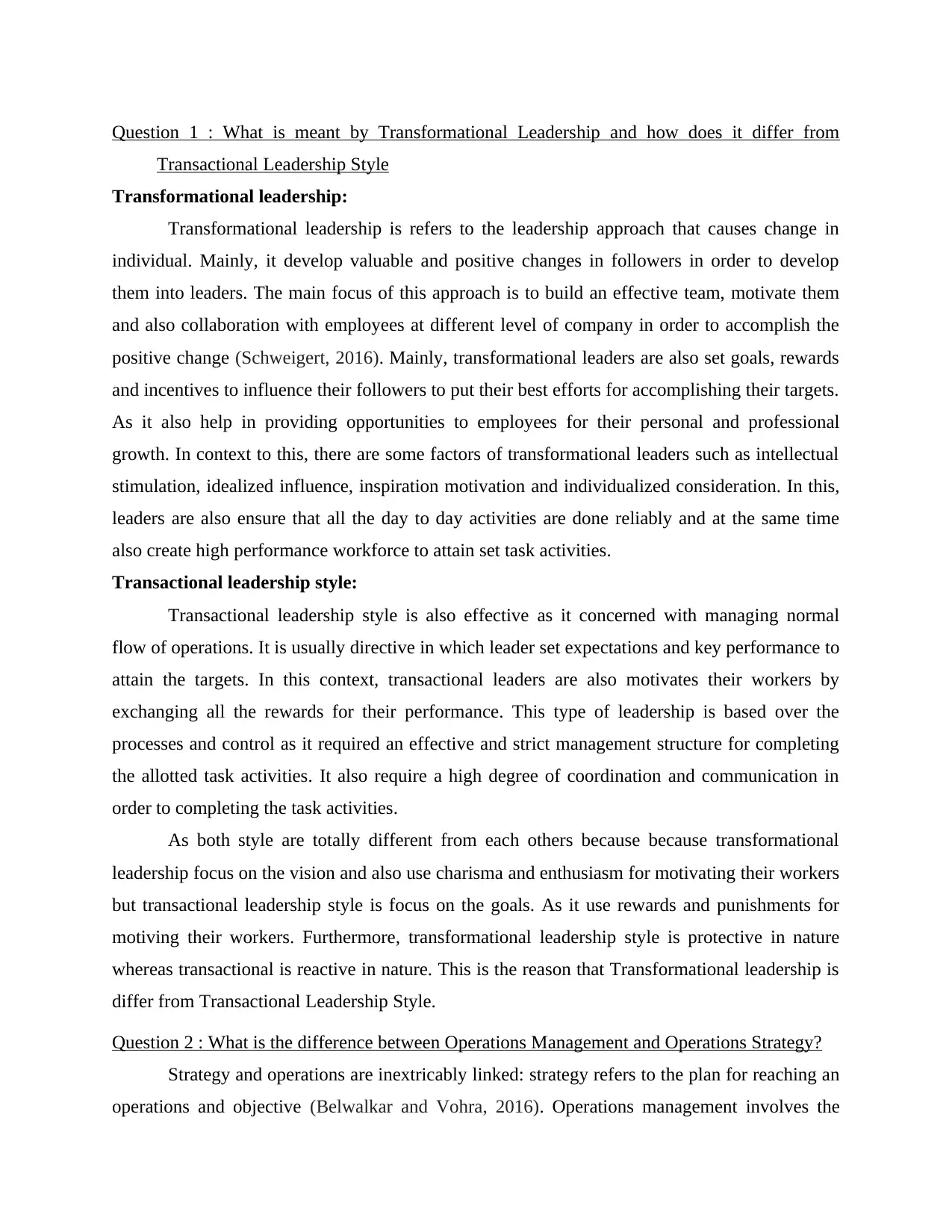
Question 1 : What is meant by Transformational Leadership and how does it differ from
Transactional Leadership Style
Transformational leadership:
Transformational leadership is refers to the leadership approach that causes change in
individual. Mainly, it develop valuable and positive changes in followers in order to develop
them into leaders. The main focus of this approach is to build an effective team, motivate them
and also collaboration with employees at different level of company in order to accomplish the
positive change (Schweigert, 2016). Mainly, transformational leaders are also set goals, rewards
and incentives to influence their followers to put their best efforts for accomplishing their targets.
As it also help in providing opportunities to employees for their personal and professional
growth. In context to this, there are some factors of transformational leaders such as intellectual
stimulation, idealized influence, inspiration motivation and individualized consideration. In this,
leaders are also ensure that all the day to day activities are done reliably and at the same time
also create high performance workforce to attain set task activities.
Transactional leadership style:
Transactional leadership style is also effective as it concerned with managing normal
flow of operations. It is usually directive in which leader set expectations and key performance to
attain the targets. In this context, transactional leaders are also motivates their workers by
exchanging all the rewards for their performance. This type of leadership is based over the
processes and control as it required an effective and strict management structure for completing
the allotted task activities. It also require a high degree of coordination and communication in
order to completing the task activities.
As both style are totally different from each others because because transformational
leadership focus on the vision and also use charisma and enthusiasm for motivating their workers
but transactional leadership style is focus on the goals. As it use rewards and punishments for
motiving their workers. Furthermore, transformational leadership style is protective in nature
whereas transactional is reactive in nature. This is the reason that Transformational leadership is
differ from Transactional Leadership Style.
Question 2 : What is the difference between Operations Management and Operations Strategy?
Strategy and operations are inextricably linked: strategy refers to the plan for reaching an
operations and objective (Belwalkar and Vohra, 2016). Operations management involves the
Transactional Leadership Style
Transformational leadership:
Transformational leadership is refers to the leadership approach that causes change in
individual. Mainly, it develop valuable and positive changes in followers in order to develop
them into leaders. The main focus of this approach is to build an effective team, motivate them
and also collaboration with employees at different level of company in order to accomplish the
positive change (Schweigert, 2016). Mainly, transformational leaders are also set goals, rewards
and incentives to influence their followers to put their best efforts for accomplishing their targets.
As it also help in providing opportunities to employees for their personal and professional
growth. In context to this, there are some factors of transformational leaders such as intellectual
stimulation, idealized influence, inspiration motivation and individualized consideration. In this,
leaders are also ensure that all the day to day activities are done reliably and at the same time
also create high performance workforce to attain set task activities.
Transactional leadership style:
Transactional leadership style is also effective as it concerned with managing normal
flow of operations. It is usually directive in which leader set expectations and key performance to
attain the targets. In this context, transactional leaders are also motivates their workers by
exchanging all the rewards for their performance. This type of leadership is based over the
processes and control as it required an effective and strict management structure for completing
the allotted task activities. It also require a high degree of coordination and communication in
order to completing the task activities.
As both style are totally different from each others because because transformational
leadership focus on the vision and also use charisma and enthusiasm for motivating their workers
but transactional leadership style is focus on the goals. As it use rewards and punishments for
motiving their workers. Furthermore, transformational leadership style is protective in nature
whereas transactional is reactive in nature. This is the reason that Transformational leadership is
differ from Transactional Leadership Style.
Question 2 : What is the difference between Operations Management and Operations Strategy?
Strategy and operations are inextricably linked: strategy refers to the plan for reaching an
operations and objective (Belwalkar and Vohra, 2016). Operations management involves the
⊘ This is a preview!⊘
Do you want full access?
Subscribe today to unlock all pages.

Trusted by 1+ million students worldwide
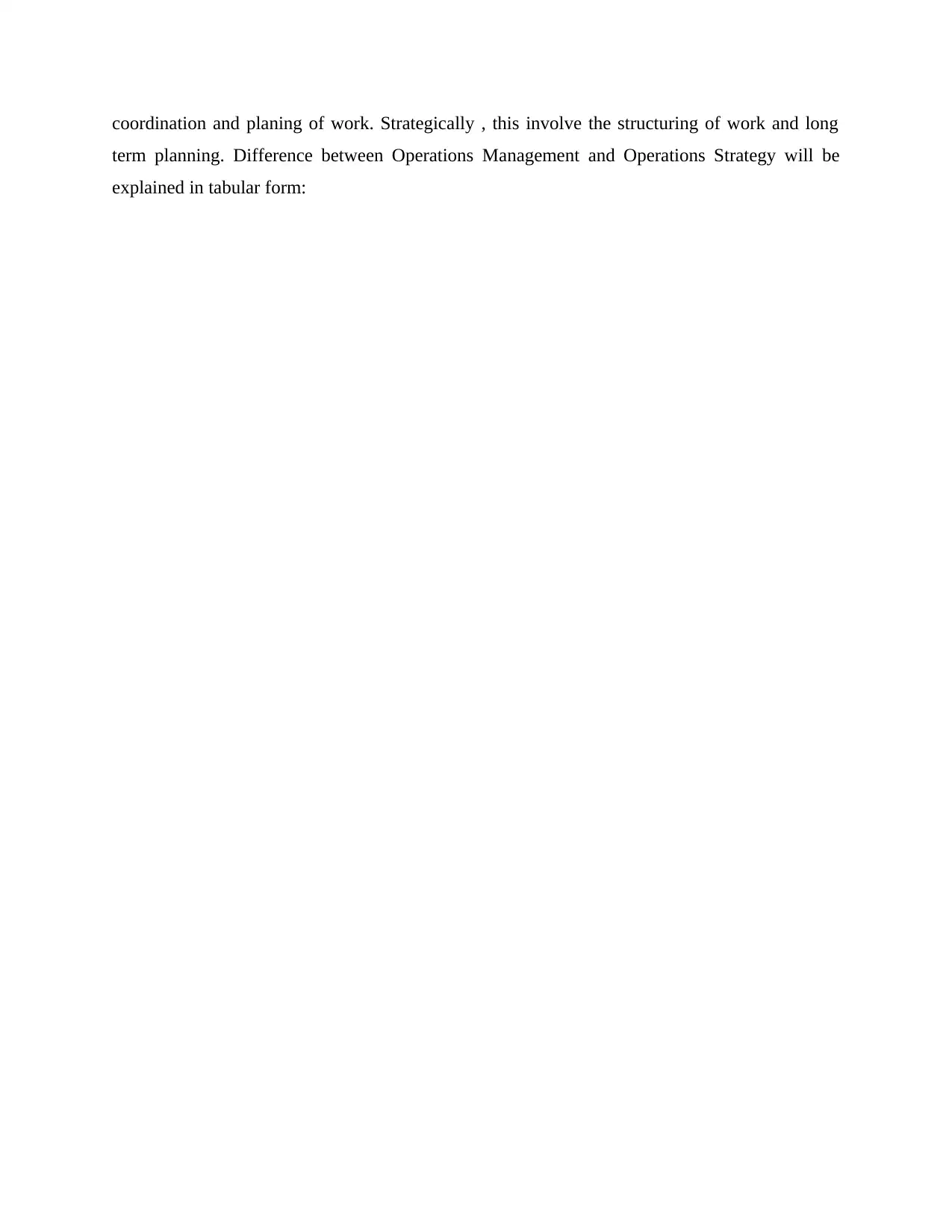
coordination and planing of work. Strategically , this involve the structuring of work and long
term planning. Difference between Operations Management and Operations Strategy will be
explained in tabular form:
term planning. Difference between Operations Management and Operations Strategy will be
explained in tabular form:
Paraphrase This Document
Need a fresh take? Get an instant paraphrase of this document with our AI Paraphraser
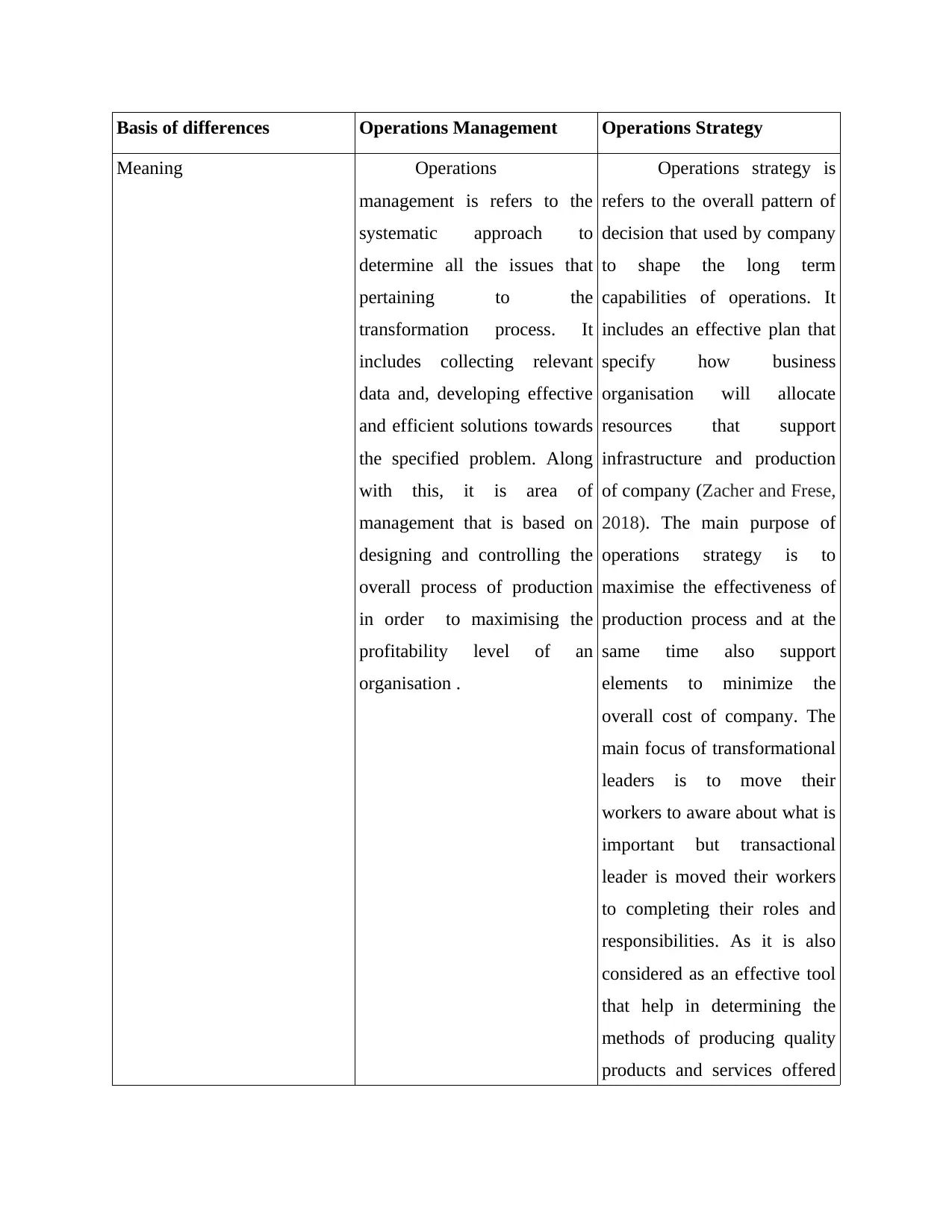
Basis of differences Operations Management Operations Strategy
Meaning Operations
management is refers to the
systematic approach to
determine all the issues that
pertaining to the
transformation process. It
includes collecting relevant
data and, developing effective
and efficient solutions towards
the specified problem. Along
with this, it is area of
management that is based on
designing and controlling the
overall process of production
in order to maximising the
profitability level of an
organisation .
Operations strategy is
refers to the overall pattern of
decision that used by company
to shape the long term
capabilities of operations. It
includes an effective plan that
specify how business
organisation will allocate
resources that support
infrastructure and production
of company (Zacher and Frese,
2018). The main purpose of
operations strategy is to
maximise the effectiveness of
production process and at the
same time also support
elements to minimize the
overall cost of company. The
main focus of transformational
leaders is to move their
workers to aware about what is
important but transactional
leader is moved their workers
to completing their roles and
responsibilities. As it is also
considered as an effective tool
that help in determining the
methods of producing quality
products and services offered
Meaning Operations
management is refers to the
systematic approach to
determine all the issues that
pertaining to the
transformation process. It
includes collecting relevant
data and, developing effective
and efficient solutions towards
the specified problem. Along
with this, it is area of
management that is based on
designing and controlling the
overall process of production
in order to maximising the
profitability level of an
organisation .
Operations strategy is
refers to the overall pattern of
decision that used by company
to shape the long term
capabilities of operations. It
includes an effective plan that
specify how business
organisation will allocate
resources that support
infrastructure and production
of company (Zacher and Frese,
2018). The main purpose of
operations strategy is to
maximise the effectiveness of
production process and at the
same time also support
elements to minimize the
overall cost of company. The
main focus of transformational
leaders is to move their
workers to aware about what is
important but transactional
leader is moved their workers
to completing their roles and
responsibilities. As it is also
considered as an effective tool
that help in determining the
methods of producing quality
products and services offered
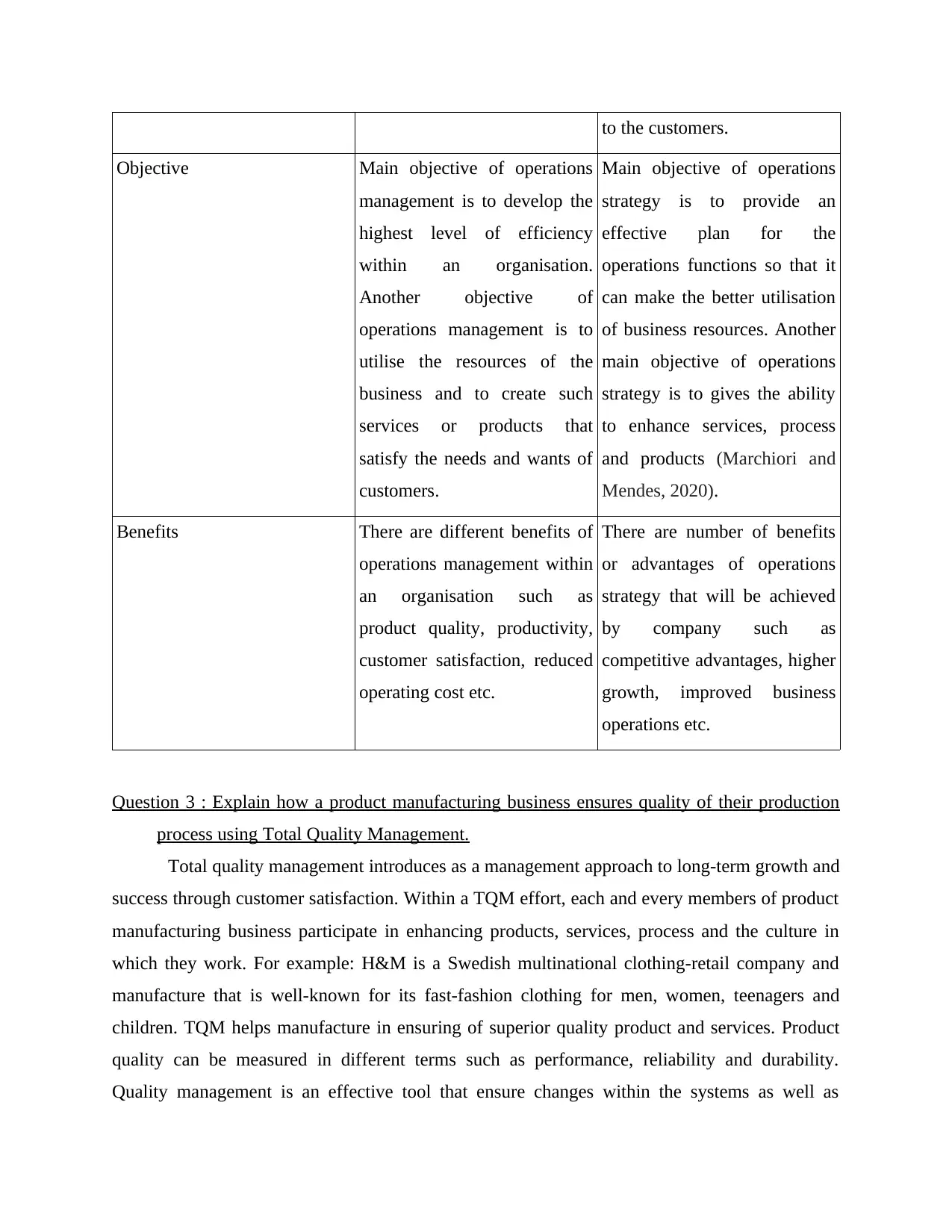
to the customers.
Objective Main objective of operations
management is to develop the
highest level of efficiency
within an organisation.
Another objective of
operations management is to
utilise the resources of the
business and to create such
services or products that
satisfy the needs and wants of
customers.
Main objective of operations
strategy is to provide an
effective plan for the
operations functions so that it
can make the better utilisation
of business resources. Another
main objective of operations
strategy is to gives the ability
to enhance services, process
and products (Marchiori and
Mendes, 2020).
Benefits There are different benefits of
operations management within
an organisation such as
product quality, productivity,
customer satisfaction, reduced
operating cost etc.
There are number of benefits
or advantages of operations
strategy that will be achieved
by company such as
competitive advantages, higher
growth, improved business
operations etc.
Question 3 : Explain how a product manufacturing business ensures quality of their production
process using Total Quality Management.
Total quality management introduces as a management approach to long-term growth and
success through customer satisfaction. Within a TQM effort, each and every members of product
manufacturing business participate in enhancing products, services, process and the culture in
which they work. For example: H&M is a Swedish multinational clothing-retail company and
manufacture that is well-known for its fast-fashion clothing for men, women, teenagers and
children. TQM helps manufacture in ensuring of superior quality product and services. Product
quality can be measured in different terms such as performance, reliability and durability.
Quality management is an effective tool that ensure changes within the systems as well as
Objective Main objective of operations
management is to develop the
highest level of efficiency
within an organisation.
Another objective of
operations management is to
utilise the resources of the
business and to create such
services or products that
satisfy the needs and wants of
customers.
Main objective of operations
strategy is to provide an
effective plan for the
operations functions so that it
can make the better utilisation
of business resources. Another
main objective of operations
strategy is to gives the ability
to enhance services, process
and products (Marchiori and
Mendes, 2020).
Benefits There are different benefits of
operations management within
an organisation such as
product quality, productivity,
customer satisfaction, reduced
operating cost etc.
There are number of benefits
or advantages of operations
strategy that will be achieved
by company such as
competitive advantages, higher
growth, improved business
operations etc.
Question 3 : Explain how a product manufacturing business ensures quality of their production
process using Total Quality Management.
Total quality management introduces as a management approach to long-term growth and
success through customer satisfaction. Within a TQM effort, each and every members of product
manufacturing business participate in enhancing products, services, process and the culture in
which they work. For example: H&M is a Swedish multinational clothing-retail company and
manufacture that is well-known for its fast-fashion clothing for men, women, teenagers and
children. TQM helps manufacture in ensuring of superior quality product and services. Product
quality can be measured in different terms such as performance, reliability and durability.
Quality management is an effective tool that ensure changes within the systems as well as
⊘ This is a preview!⊘
Do you want full access?
Subscribe today to unlock all pages.

Trusted by 1+ million students worldwide
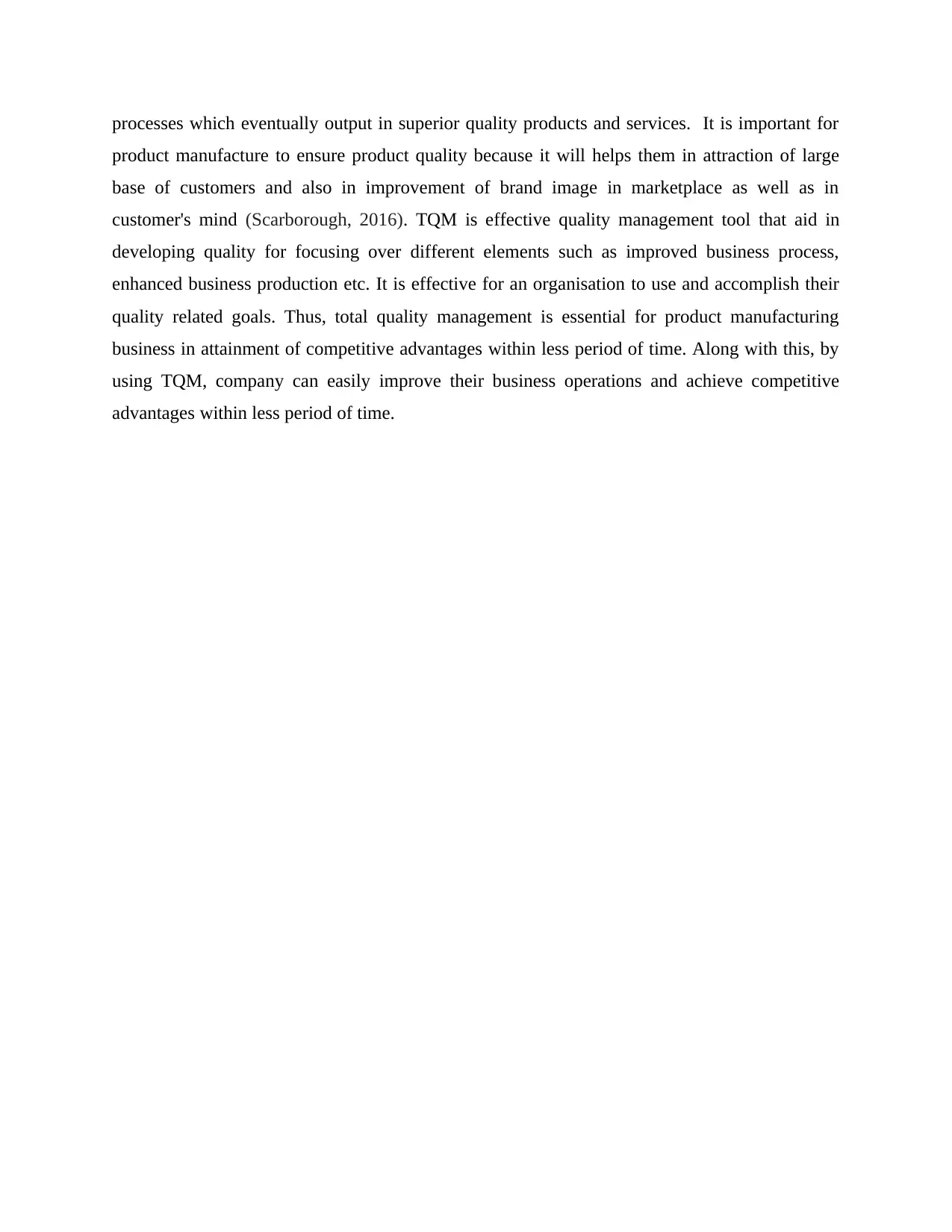
processes which eventually output in superior quality products and services. It is important for
product manufacture to ensure product quality because it will helps them in attraction of large
base of customers and also in improvement of brand image in marketplace as well as in
customer's mind (Scarborough, 2016). TQM is effective quality management tool that aid in
developing quality for focusing over different elements such as improved business process,
enhanced business production etc. It is effective for an organisation to use and accomplish their
quality related goals. Thus, total quality management is essential for product manufacturing
business in attainment of competitive advantages within less period of time. Along with this, by
using TQM, company can easily improve their business operations and achieve competitive
advantages within less period of time.
product manufacture to ensure product quality because it will helps them in attraction of large
base of customers and also in improvement of brand image in marketplace as well as in
customer's mind (Scarborough, 2016). TQM is effective quality management tool that aid in
developing quality for focusing over different elements such as improved business process,
enhanced business production etc. It is effective for an organisation to use and accomplish their
quality related goals. Thus, total quality management is essential for product manufacturing
business in attainment of competitive advantages within less period of time. Along with this, by
using TQM, company can easily improve their business operations and achieve competitive
advantages within less period of time.
Paraphrase This Document
Need a fresh take? Get an instant paraphrase of this document with our AI Paraphraser
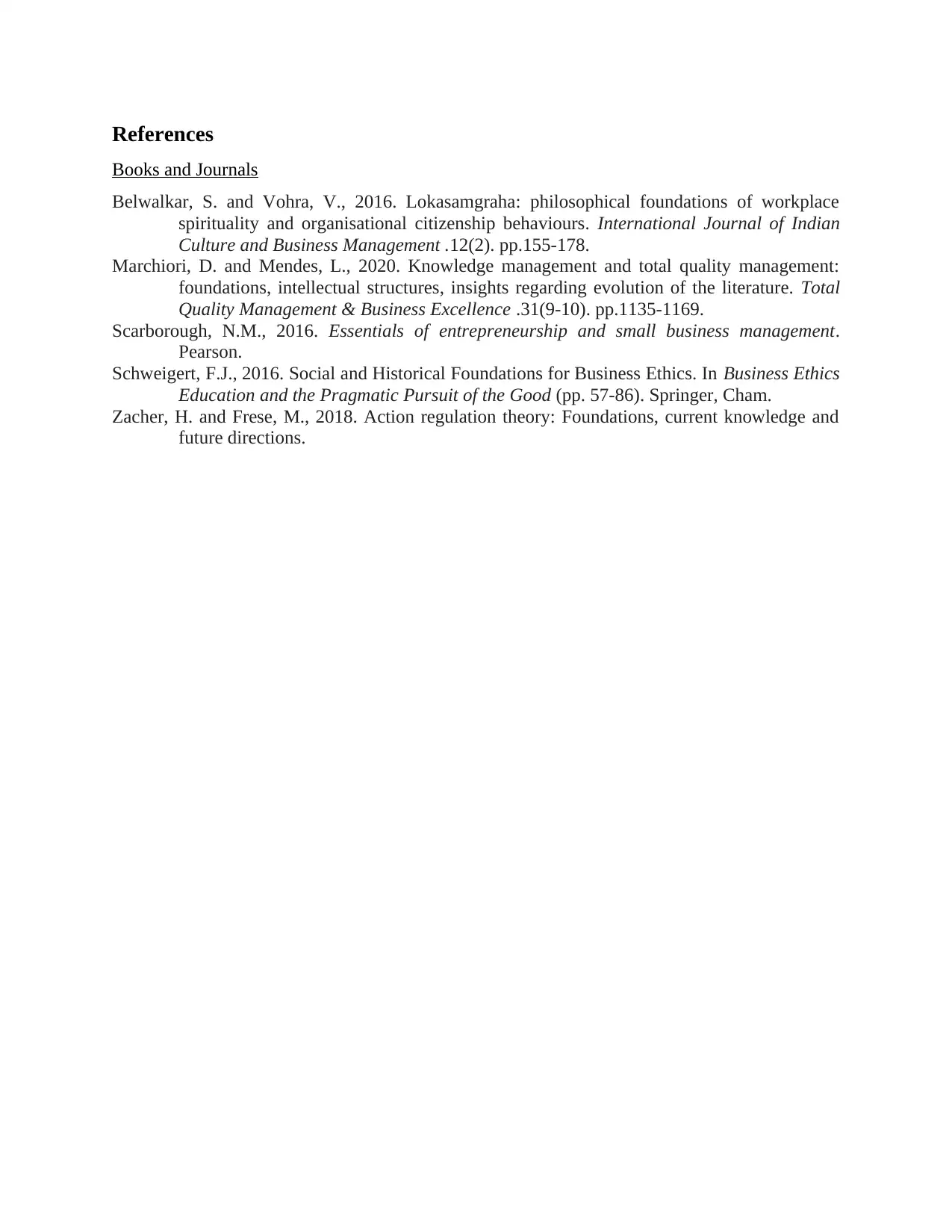
References
Books and Journals
Belwalkar, S. and Vohra, V., 2016. Lokasamgraha: philosophical foundations of workplace
spirituality and organisational citizenship behaviours. International Journal of Indian
Culture and Business Management .12(2). pp.155-178.
Marchiori, D. and Mendes, L., 2020. Knowledge management and total quality management:
foundations, intellectual structures, insights regarding evolution of the literature. Total
Quality Management & Business Excellence .31(9-10). pp.1135-1169.
Scarborough, N.M., 2016. Essentials of entrepreneurship and small business management.
Pearson.
Schweigert, F.J., 2016. Social and Historical Foundations for Business Ethics. In Business Ethics
Education and the Pragmatic Pursuit of the Good (pp. 57-86). Springer, Cham.
Zacher, H. and Frese, M., 2018. Action regulation theory: Foundations, current knowledge and
future directions.
Books and Journals
Belwalkar, S. and Vohra, V., 2016. Lokasamgraha: philosophical foundations of workplace
spirituality and organisational citizenship behaviours. International Journal of Indian
Culture and Business Management .12(2). pp.155-178.
Marchiori, D. and Mendes, L., 2020. Knowledge management and total quality management:
foundations, intellectual structures, insights regarding evolution of the literature. Total
Quality Management & Business Excellence .31(9-10). pp.1135-1169.
Scarborough, N.M., 2016. Essentials of entrepreneurship and small business management.
Pearson.
Schweigert, F.J., 2016. Social and Historical Foundations for Business Ethics. In Business Ethics
Education and the Pragmatic Pursuit of the Good (pp. 57-86). Springer, Cham.
Zacher, H. and Frese, M., 2018. Action regulation theory: Foundations, current knowledge and
future directions.
1 out of 8
Related Documents
Your All-in-One AI-Powered Toolkit for Academic Success.
+13062052269
info@desklib.com
Available 24*7 on WhatsApp / Email
![[object Object]](/_next/static/media/star-bottom.7253800d.svg)
Unlock your academic potential
Copyright © 2020–2026 A2Z Services. All Rights Reserved. Developed and managed by ZUCOL.





